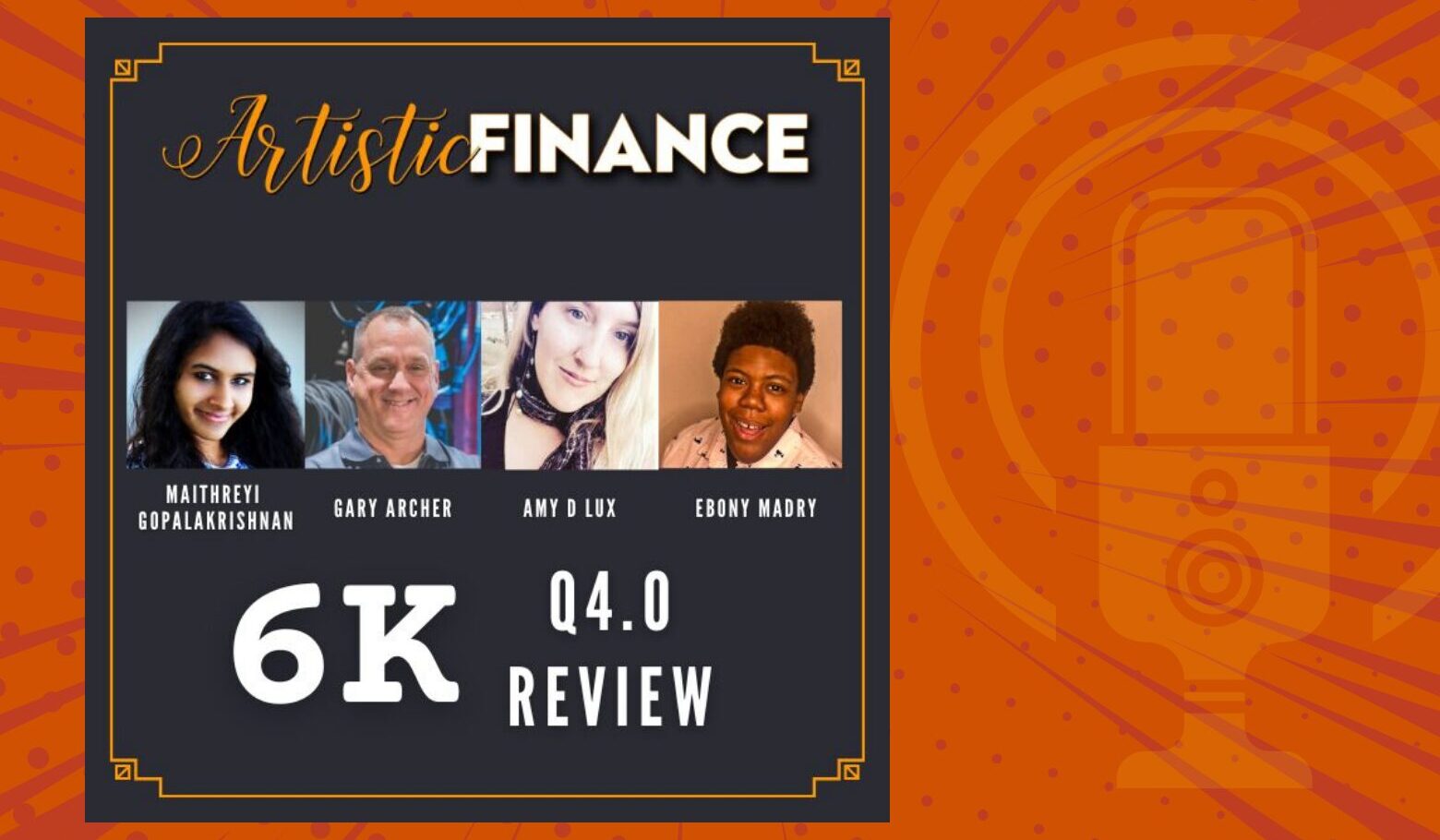Artistic Finance 6K Update: 4 Years Later

Host Ethan Steimel reconnects with the original participants of the Artistic Finance 6K experiment—a four-year investment challenge that began in 2020 with the goal of helping artists demystify personal finance. With $1,500 each, four artist-investors put their money into everything from Disney stock to Indian mutual funds, green energy to total market ETFs. Now, four years later, Ethan gathers Maithreyi Gopalakrishnan, Ebony Madry, Amy D. Lux, and Gary Archer to reflect on what worked, what didn’t, and how their financial mindsets have evolved.
In this update episode, they unpack lessons learned, regrets and wins, and share honest insights into the realities of investing as creatives. Whether their portfolios grew or dipped, each artist came away with a stronger sense of financial agency—and a deeper belief that investing isn’t just for Wall Street, it’s for working artists too.
What was the original goal of the Artistic Finance 6K experiment?
Ethan Steimel launched the 6K experiment in 2020 to demystify investing for artists. He gathered four artist-investors and gave each $1,500 to invest as they saw fit. The goal? Track their progress over four years and compare strategies from a real-world artist perspective.
Each participant had different experience levels and investment approaches, making this a practical learning journey rather than a high-stakes competition. The podcast served as a live documentation of their decisions, reasoning, mistakes, and gains.
How did each person invest their $1,500, and what’s the outcome after 4 years?
Each guest chose a distinct path:
Amy D. Lux invested in VTI, a diversified index fund that mirrors the entire U.S. stock market.
Result: Her portfolio grew to $2,201, a 46.7% increase over 4 years.
She highlighted the simplicity and low risk of passive investing: “Set it and forget it actually works.”
Gary Archer chose to invest entirely in Disney (DIS), trusting in the entertainment giant.
Result: His investment fell to $1,284, a 14.4% decrease.
He reflected on underestimating market volatility and overconfidence in a single brand.
Ebony Madry focused on green and sustainable companies, including Vestas Wind, ChargePoint, and Sunrun.
Result: Her portfolio dropped to $1,185, a 21% loss.
Ebony appreciated the experiment as a learning experience in the risks of speculative investing and market trends.
Maitreyi Gopalakrishnan invested in Indian mutual funds via ICICI Prudential’s Bluechip fund and Axis Growth Opportunities.
Result: Her investment rose to $2,213, a 47.5% gain, the highest performer.
Her strategy emphasized long-term growth and the economic rise of India.
What were the biggest lessons learned by the panelists over these four years?
Amy emphasized that passive investing works for those who don’t want to check markets daily. She recommends automation and consistency for artists with fluctuating incomes.
Gary learned the danger of overconcentration. Betting on one company—even a trusted one—can backfire. He also wished he had researched broader ETFs or split his funds.
Ebony expressed that values-based investing is admirable, but it doesn’t always mean short-term returns. “Mission-driven” investing often requires more patience and research.
Maitreyi underscored the value of understanding your market. She invested in what she knew—Indian markets—and benefited from that regional familiarity.
How do they feel about investing now compared to when the experiment started?
All four said their mindset had changed significantly.
Amy now sees investing as part of her overall financial wellness—not just saving but growing wealth responsibly.
Gary admitted he would’ve never taken the leap without the push from the podcast. He’s still investing and has broadened his portfolio.
Ebony gained the confidence to talk openly about money and even taught friends how to set up brokerage accounts.
Maitreyi became an advocate for financial literacy and continues to invest both in India and the U.S.
What advice would they give to artists who are afraid to start investing?
The panel agreed: Just start. You don’t need a lot of money, you don’t need to be perfect, and you don’t have to be glued to the stock ticker.
Start small—even $10 or $20 a month into an index fund can make a difference over time.
Use tools like Roth IRAs, auto-invest features, and robo-advisors to reduce friction.
Read or listen to financial education materials from artist-friendly sources like Artistic Finance.
Be patient and consistent. Don’t let perfectionism delay action.
Listen to this Episode on:
Website / Spotify / Apple Podcasts / YouTube
This episode of the Artistic Finance podcast is hosted by Ethan Steimel.
Editor's Note: At StageLync, an international platform for the performing arts, we celebrate the diversity of our writers' backgrounds. We recognize and support their choice to use either American or British English in their articles, respecting their individual preferences and origins. This policy allows us to embrace a wide range of linguistic expressions, enriching our content and reflecting the global nature of our community.
🎧 Join us on the StageLync Podcast for inspiring stories from the world of performing arts! Tune in to hear from the creative minds who bring magic to life, both onstage and behind the scenes. 🎙️ 👉 Listen now!
